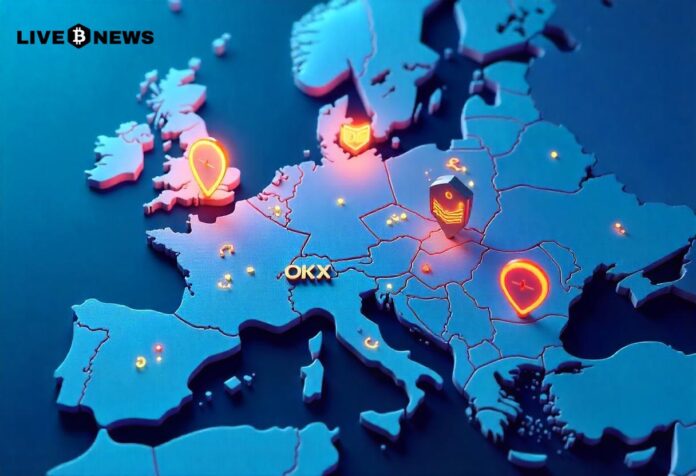- Platforms offer 270+ cryptocurrencies and 60+ euro trading pairs.
- MiCA compliance ensures transparency and investor protection.
- Features include spot trading, staking, and localized support.
Full regulated platform operations in Poland and Germany were launched by the international cryptocurrency exchange OKX on June 17, 2025. Such crypto exchanges are in line with the Markets in Crypto-Assets (MiCA) framework of the European Union, meaning that they follow high regulatory requirements. The shift enhances the presence of OKX in two of the biggest economies in Europe.
The platforms allow trading in more than 270 cryptocurrencies such as Bitcoin, Ethereum, and Tether. There are over 60 crypto-to-euro Trading Pairs supported on a deep liquidity and low fees basis. By using the Single Euro Payments Area (SEPA) as well as the other payment alternatives available in the local area, it is simple to make deposits and withdrawals in Euros.
In January 2025, OKX obtained its MiCA license and had the authorization to operate in 28 countries of the European Economic Area (EEA). The license will guarantee compliance with the requirements of consumer protection and transparency. This will make OKX a preferred choice of retail and institutional investors.
Services and Features for German and Polish Users
The new exchanges offer services such as automated trading bots, spot trading, and staking. They provide local customer service and euro-denominated Earn products that both novice and experienced traders can use. The infrastructure of OKX is security-oriented, featuring a level of bank encryption and cold storage technology.
OKX Europe CEO E.Ghoos stressed accessibility. He said that our services are secure and transparent, and support local languages and currencies through our platforms. This strategy will improve the experience of the user and encourage the usage of crypto in the location.
Analysts estimate that Germany will achieve the highest annual compound growth rate in Europe by 2030 in the crypto market. Poland represents a crypto market with a pro-Bitcoin government, and it also has a growing potential market, which makes both markets potentially strategic in terms of OKX expansion.
OKX Wallet, a multichain system, connects the platforms and enables them to interconnect with more than 120 chains while allowing access to thousands of decentralized applications (DApps). This enables users to access decentralized finance (DeFi) and non-fungible tokens (NFTs) without any difficulties.
The conformity of OKX to MiCA rules makes it stand out from the competition with Binance and Kraken, which continue their way through the authorization path. The willingness of the exchange to abide by the regulations will make it appeal to institutional investors who want a stable market to trade.
The launch activities in Berlin and Warsaw reflected the approach of OKX to compliance. Germany’s stricter licensing demands and Poland’s adherence to EU policies have emphasized the need for regulatory clarity in these markets.
OKX has approximately sixty million users globally and operates with licenses in the United Arab Emirates, Singapore, and Australia. The company’s proof-of-reserves reports confirm that it maintains a 1:1 ratio in terms of reserves, so it does not jeopardize customer funds.





